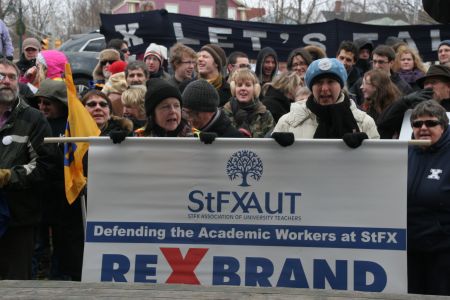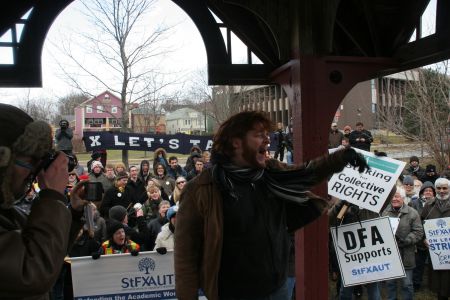ANTIGONISH – About 350 high-spirited strikers and their supporters gathered outside the campus of St. Francis Xavier University Feb. 1, as the St. F.X. Association of University Teachers (AUT) finished their first full strike week.
Greetings and statements of solidarity came pouring in from labour organizations across the province, and sister unions across the country. The national AUT bureau also provided the St. F.X. branch with a legal defence fund cheque for $1 million.
The AUT, the certified bargaining agent for the academic faculty at St. F.X., has been without a contract for several months. Over one third of the bargaining unit is comprised of part-time and casual staff, and these are positions where membership are not guaranteed job security or benefits. It is a case of full-time, and older, staff, in positions where they are potentially ready to retire, going to bat for the next generation of academic staff.
“We want equity in the union. We want reasonable compensation for the faculty, but we have a very mixed union with people who are far less secure in their employment than us,” says Chris Fraser, professor in the history department and chief grievance officer. “We're very conscious about wanting to have some equity for those people, especially people in our labs and writing centre and some of our part-time folks. Twenty per cent of our members make less than $20,000 a year; a lot of them have no benefits at all; it's just not right. So the bulk of us who are faculty have made a conscious decision that we're standing up to win a fair contract for them, and also some decent compensation for ourselves as well.”
The biggest issue on the bargaining table is salary. The AUT is seeking a 6.9 per cent increase in salary over the next four years, a demand that the university administration estimates at costing $8.2 million. The university, for its part, claims to be offering $5.5 million in salary increases over the next four years, and has been publicly pleading poverty.
St. F.X. President, Dr. Sean Riley, noted in a Jan. 17 budget information session that St. F.X. is in the “the most serious financial crisis this year in living memory,” the argument then being that the AUT's demands simply can't be met.
The AUT says that the financial crisis to which Riley alludes has been caused by gross mismanagement at the administrative level, and has nothing to do with the quality of academia being offered at St. F.X., where since 1996 the university has invested over $200 million in infrastructure projects. These include the construction of new residences, despite there being a vacancy in dorm spaces, and other projects that amount to “window dressing,” rather than sticking to the university's “academic mission.”
“We feel the culture of the university is becoming increasingly corporatized,” says Peter McInnis, president of the St. F.X. AUT. “It's deviating from the academic mission. [The administration is] building all kinds of things that are nice, but not really central to what students need to learn, and the research that will be done in the classrooms and the labs.”
The AUT also points to the top-heavy administration at St. F.X. as being at least partially responsible for the current crisis. They note that in 2010-2011 the president of St. F.X. made $305,360, while the vice-president of finances made $212,507. They also note that the university has the most vice-presidents of any university in the region.
The fight between the administration and the AUT has begun to turn dirty, with the administration taking out numerous newspaper advertisements, and sending mass emails to alumni that paint a “one-sided” picture of the strike.
“There's been a pretty steady stream of propaganda over the last several weeks from the administration,” says Betsy MacDonald, class of 2007. “One example would be an email that recently went out to the alumni, a leaked list of salaries of St. F.X. Faculty and administrators who earn over $100,000. Faculty members on that list only represent 10 per cent of members on AUT, yet what that list does is create the impression that these people who are striking are highly paid and are just greedy.”
As for the quality of her experience at her alma mater, MacDonald has no question in her mind as to what made it positive.
“I had some fabulous professors and I had a wonderful experience at St. F.X., but it wasn't because of nice buildings or the football field or the glossy PR campaigns; it was really the faculty that made my experience valuable.”
Students, who stand to be the potential victims of the strike if it continues much past one month and threatens the academic year, were out in strong numbers at yesterday's rally. The bigger picture, of job security and equity, was not lost on those in attendance.
"I know the music department, we're all really supportive of the AUT and we're standing behind it pretty solidly," says Elizabeth O'Hanley, a fourth year student. "This could easily be us someday. As much as it's upsetting and we're missing classes and it's our tuition, it's not all about us. We'll stand behind them. We've been out picketing with them. Whatever we can do to help."
The AUT strike is also only the tip of the iceberg of worker relations issues at St. F.X.
Earlier in the week, Canadian Auto Workers local 2107, representing 115 cafeteria workers and housing workers at the university, as well as skilled workers, also voted to reject a proposed contract, and are now in conciliation. And earlier in the month, the Nova Scotia General Employees Union local 88, representing 140 support staff at St. F.X. also voted to strike. Whether both unions follow the AUT onto the picket lines over the coming days remains to be seen.







